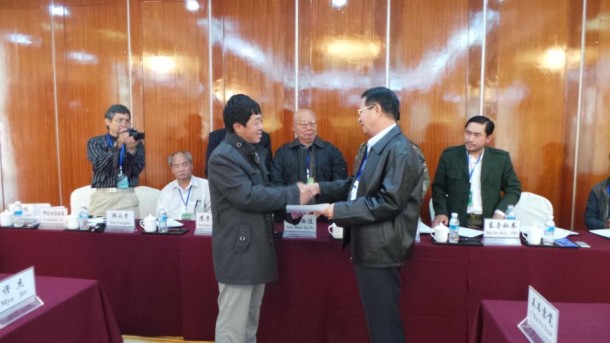RANGOON — Burma’s government and the Kachin Independence Army (KIA) will hold a meeting in Naypyidaw this month, nearly four months after the rebel armed group asked to meet to discuss the killing of 23 cadets in a Laiza shelling on Nov. 19.
San Aung, a KIA-affiliated peace broker, said the bilateral meeting would take place during the larger peace talks scheduled for mid-March. The KIA’s Deputy Chief of Staff Gen. Gun Maw would be among the leaders in attendance, he added.
“This meeting will build more trust between the government and KIA,” San Aung said.
“There are many roadblocks to achieving peace in our Kachin area. Our leaders will mainly discuss those sticking points. We have had agreements in the past not to fight, but the agreements have had no effect—the clashes have continued. So, we will talk about it again.”
The KIA has not yet been informed of who will be among the government’s delegation.
It has been about five months since the government met formally with the Nationwide Ceasefire Coordinating Team (NCCT), which represents most of the nation’s ethnic armed groups. Since that meeting, fighting has escalated in Kachin and northern Shan states, with particularly intense clashes between the Burma Army and ethnic Kokang rebels last month.
The NCCT and government negotiators are attempting to reach a nationwide ceasefire agreement, which Naypyidaw says is necessary before a dialogue can begin to address ethnic groups’ grievances and political aspirations.
San Aung said the issue of the 23 slain cadets would be on the meeting’s agenda. Though the Burma Army attack targeted a KIA training facility, all of the fatalities were soldiers from allied ethnic armies, including the Ta’ang National Liberation Army (TNLA).
Some TNLA members will join the KIA delegation to Naypyidaw, according to a TNLA leader.
“Some colonels from our TNLA will join the meeting. We are prepared to talk about our cadets, who were killed,” said Tar Bone Kyaw, the TNLA general secretary.
The TNLA, along with the KIA, does not have a bilateral ceasefire agreement with the government.
“We will negotiate more with our allied armed forces about what to talk about at the meeting. From our side, we are prepared to ask them why they killed our cadets,” Tar Bone Kyaw said.
The Burma Army held a press conference on Nov. 20, at which it claimed the shelling was accidental. That explanation has not satisfied many ethnic armed groups.
“They may have intentionally killed our cadets. But this is our question: Did they kill our cadets to defend themselves? If they killed them intentionally, it will be difficult to have peace talks with us,” said Tar Bone Kyaw.
He said dialogue with the government was important to prevent a repeat of the Laiza shelling.
“It’s not only us that holds military trainings,” the TNLA leader said. “They [the Burma Army] also have military trainings. So, we could go and kill them if we wanted to do it. This is why we need to talk about it.”
The NCCT will hold a meeting with the government’s peace negotiators in Rangoon beginning March 16. The peace talks have been pushed back multiple times, with negotiators deadlocked and conflict continuing to rage in ethnic border regions.

















